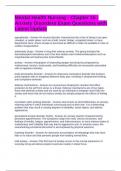Mental Health Nursing - Chapter 15 -
Anxiety Disorders Exam Questions with
Latest Update
agoraphobia - Answer-An anxiety disorder characterized by a fear of being in an open,
crowded, or public place, such as a field, tunnel, bridge, congested street, or busy
department store, where escape is perceived as difficult or help not available in case of
sudden incapacitation.
antianxiety drugs - Answer-A drug that reduces anxiety. The group includes the
benzodiazepine derivatives and a few less widely used nonbenzodiazepines such as
meprobamate and hydroxyzine hydrochloride.
anxiety - Answer-Anticipation of impending danger and dread accompanied by
restlessness, tension, tachycardia, and breathing difficulty not necessarily associated
with an apparent stimulus.
body dysmorphic disorder - Answer-An obsessive-compulsive disorder that involves
preoccupation with an imagined defective body part, resulting in obsessional thinking
and compulsive behavior
defense mechanisms - Answer-An unconscious intrapsychic reaction that offers
protection to the self from stress or a threat. Defense mechanisms are of two types:
those that diminish anxiety and are used by an individual to integrate more fully into
society and those that do not reduce anxiety but simply postpone the effects of feeling
it.
excoriation (skin picking) disorder - Answer-Also known as dermotillomania; an anxiety-
relieving activity in which individuals consciously pick at their skin. It is a distressing
problem that may result in varying degrees of disability, social stigma, and altered
appearance.
generalized anxiety disorder (GAD) - Answer-An anxiety reaction characterized by
persistent apprehension. The symptoms range from mild, chronic tenseness, with
feelings of timidity, fatigue, apprehension, and indecisiveness, to more intense states of
restlessness and irritability that may lead to aggressive acts. In extreme cases, the
overwhelming emotional discomfort is accompanied by physical reactions.
hoarding disorder - Answer-An obsessive accumulation of belongings that may have
little or no value and that prevents people from leading normal lives.
mild anxiety - Answer-This first level of anxiety occurs in the normal experience of
everyday living and allows people to perceive reality in sharp focus.
, moderate anxiety - Answer-This second level of anxiety results in selective inattention
and some diminished thinking, although learning and problem solving can still occur.
Symptoms include tension, pounding heart, increased pulse and respiration rate,
perspiration, gastric discomfort, headache, urinary urgency, voice tremors, and shaking.
obsessive-compulsive disorder (OCD) - Answer-An anxiety disorder characterized by
recurrent and persistent thoughts, ideas, and feelings or repetitive acts sufficiently
severe to cause marked distress, consume considerable time, or significantly interfere
with the patient's occupational, social, or interpersonal functioning.
panic - Answer-An intense, sudden, and overwhelming fear or feeling of anxiety that
produces terror and immediate physiologic changes that result in paralyzed immobility
or senseless, hysteric behavior.
panic disorder - Answer-A psychologic disorder that is characterized by recurrent
attacks of anxiety or terror and usually results in the development of one or more
phobias.
separation anxiety disorder (SAD) - Answer-Fear and apprehension caused by
separation from familiar surroundings and significant people. The syndrome occurs
commonly in an infant separated from its mother or mothering figure or approached by a
stranger.
severe anxiety - Answer-This third level of anxiety is debilitating and causes a person to
focus on one particular detail or many scattered details. Learning cannot occur, and
other aspects of the environment go unnoticed, even when another points them out.
social anxiety disorder - Answer-Also called social phobia; characterized by severe
anxiety or fear provoked by exposure to a social or performance situation that will be
evaluated negatively by others.
specific phobia - Answer-Fear and avoidance of a single object, situation, or activity;
common in the general population.
trichotillomania (hair-pulling) disorder - Answer-a distressing problem in which
individuals compulsively pull hair out (typically from the scalp), resulting in varying
degrees of disability, social stigma, and altered appearance.
What defense mechanisms can only be used in healthy ways? - Answer-Altruism and
sublimation
Altruism and sublimation are known as mature defenses. They cannot be used in
unhealthy ways. Altruism results in resolving emotional conflicts by meeting the needs
of others, and sublimation substitutes socially acceptable activity for unacceptable
impulses.




